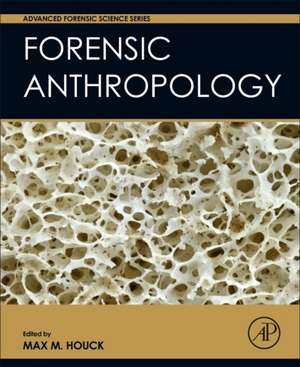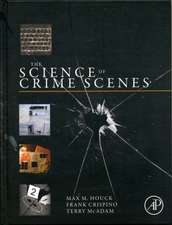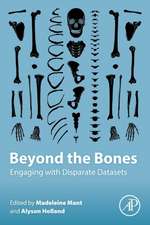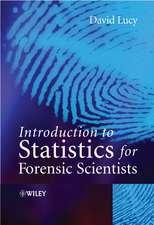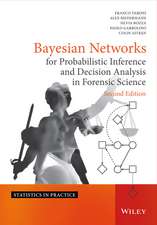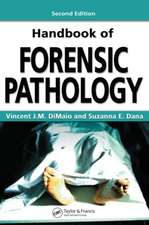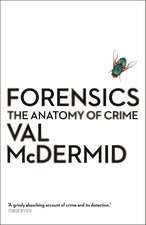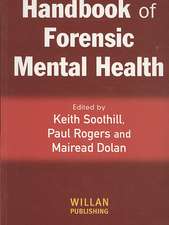Forensic Anthropology: Advanced Forensic Science Series
Editat de Max M. Houcken Limba Engleză Hardback – 24 ian 2017
- Provides the basic principles of forensic science and an overview of forensic anthropology
- Contains sections on taphonomy, recovery, analysis, pathology, and identification
- Covers statistical interpretation of evidence using the classical-frequentist approach and Bayesian analysis, measurement uncertainty, and standard methods
- Includes a section on professional issues, such as: from crime scene to court, expert witness testimony, and health and safety
- Incorporates effective pedagogy, key terms, review questions, discussion questions, and additional reading suggestions
Preț: 447.27 lei
Preț vechi: 579.71 lei
-23% Nou
Puncte Express: 671
Preț estimativ în valută:
85.59€ • 92.94$ • 71.90£
85.59€ • 92.94$ • 71.90£
Carte tipărită la comandă
Livrare economică 15-29 aprilie
Preluare comenzi: 021 569.72.76
Specificații
ISBN-13: 9780128022146
ISBN-10: 0128022140
Pagini: 436
Dimensiuni: 191 x 235 x 24 mm
Greutate: 1.1 kg
Editura: ELSEVIER SCIENCE
Seria Advanced Forensic Science Series
ISBN-10: 0128022140
Pagini: 436
Dimensiuni: 191 x 235 x 24 mm
Greutate: 1.1 kg
Editura: ELSEVIER SCIENCE
Seria Advanced Forensic Science Series
Cuprins
Section 1. Overview
Forensic Anthropology: An Introduction
History of Forensic Anthropology
Principles of Forensic Science
Transfer
Interpretation/The Comparative Method
Forensic Classification of Evidence
Key Terms
Review Questions
Discussion Questions
Section 2. Taphonomy
Introduction
Animal Effects on Bones
Forensic Taphonomy
Postmortem Interval
Early and Late Postmortem Changes
Estimation of the Time Since Death
Key Terms
Review Questions
Discussion Questions
Section 3. Recovery
Introduction
Archeology
Packaging
Preservation
Recording
Recovery of Human Remains
Collection and Chain of Evidence
Contamination
Principles for the Organization of Forensic Support
Key Terms
Review Questions
Discussion Questions
Section 4. Analysis
Introduction
Species: Human versus Nonhuman
Sexing
Aging the Dead and the Living
Stature and Build
Ancestry
Forensic Age Estimation
Key Terms
Review Questions
Discussion Questions
Section 5. Pathology
Introduction
Bone Pathology and Antemortem Trauma
Biomechanics of Bone Trauma
Bone Trauma
Blunt Injury
Sharp Trauma
Gunshot Wounds
Torture
Key Terms
Review Questions
Discussion Questions
Section 6. Identification
Introduction
Identification of the Living
Facial Approximation
Personal Identification in Forensic Anthropology
Odontology
Disaster Victim Identification
The National Missing and Unidentified Persons System (NamUs)
Identification
Key Terms
Review Questions
Discussion Questions
Section 7. Statistics and Interpretation
Introduction
The Frequentist Approach to Forensic Evidence Interpretation
Statistical Interpretation of Evidence: Bayesian Analysis
Forensic Intelligence
Forensic Intelligence Analysis
Standard Methods
Measurement Uncertainty
Key Terms
Review Questions
Discussion Questions
Section 8. Professional Topics
Introduction
Crime Scene to Court
Expert Witness Qualifications and Testimony
Forensic Laboratory Reports
Legal Aspects of Forensic Science
Health and Safety
Ethics
Key Terms
Review Questions
Discussion Questions
Forensic Anthropology: An Introduction
History of Forensic Anthropology
Principles of Forensic Science
Transfer
Interpretation/The Comparative Method
Forensic Classification of Evidence
Key Terms
Review Questions
Discussion Questions
Section 2. Taphonomy
Introduction
Animal Effects on Bones
Forensic Taphonomy
Postmortem Interval
Early and Late Postmortem Changes
Estimation of the Time Since Death
Key Terms
Review Questions
Discussion Questions
Section 3. Recovery
Introduction
Archeology
Packaging
Preservation
Recording
Recovery of Human Remains
Collection and Chain of Evidence
Contamination
Principles for the Organization of Forensic Support
Key Terms
Review Questions
Discussion Questions
Section 4. Analysis
Introduction
Species: Human versus Nonhuman
Sexing
Aging the Dead and the Living
Stature and Build
Ancestry
Forensic Age Estimation
Key Terms
Review Questions
Discussion Questions
Section 5. Pathology
Introduction
Bone Pathology and Antemortem Trauma
Biomechanics of Bone Trauma
Bone Trauma
Blunt Injury
Sharp Trauma
Gunshot Wounds
Torture
Key Terms
Review Questions
Discussion Questions
Section 6. Identification
Introduction
Identification of the Living
Facial Approximation
Personal Identification in Forensic Anthropology
Odontology
Disaster Victim Identification
The National Missing and Unidentified Persons System (NamUs)
Identification
Key Terms
Review Questions
Discussion Questions
Section 7. Statistics and Interpretation
Introduction
The Frequentist Approach to Forensic Evidence Interpretation
Statistical Interpretation of Evidence: Bayesian Analysis
Forensic Intelligence
Forensic Intelligence Analysis
Standard Methods
Measurement Uncertainty
Key Terms
Review Questions
Discussion Questions
Section 8. Professional Topics
Introduction
Crime Scene to Court
Expert Witness Qualifications and Testimony
Forensic Laboratory Reports
Legal Aspects of Forensic Science
Health and Safety
Ethics
Key Terms
Review Questions
Discussion Questions
Recenzii
"The strengths of the book lie in that the selection of contributions extends the scope beyond the traditional crime scene to court model with its inclusion of the post-conviction role of the forensic anthropologist. The highly respected international pool of contributors is generally well-matched to the topics." --The Chartered Society of Forensic Sciences
